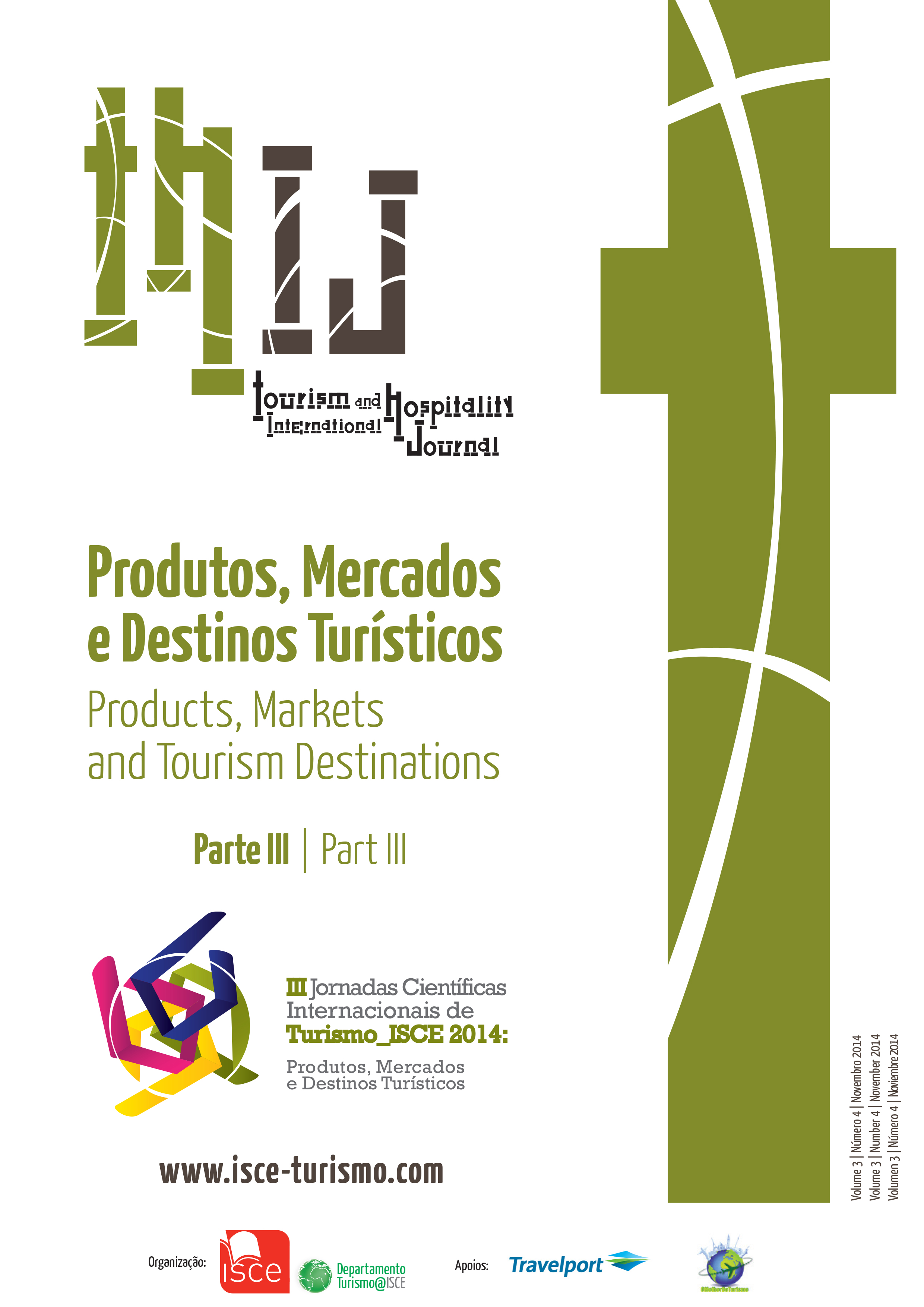Tourism b-Learning
DOI:
https://doi.org/10.57883/thij3(3)2014.30242Keywords:
Tourism, B-learning, E-learning, Teaching in b-learning, Training in b-learnig, ISCEAbstract
With the implementation of the Bologna process in the university context in Portugal, the b-Learning takes now as one of the main tools for the skills model development. This research begins by considering different meanings advocated by several authors to clarify the concepts of e-Learning and b-Learning. Thus, it was necessary to investigate the models available on this type of education that would allow the characterization of the profile of a "b-Teacher", an essential condition for this study. In the absence of a table that defines all the necessary skills, the bibliographic research allowed responses, which however need framework and contextualization to be effective in the current context. This paper also considers an observation of good practices produced by the study that Leite et al. (2009a) made referring to a process of implementation of b-Learning at the Oporto University and based on the testimony of six faculty winners of the e-Learning Excellence Prize. This study ends with a comparative approach, using a questionnaire, of the skills retrieved in the bibliographical review with the abilities set for the teachers from the School of Tourism ISCE
References
Adão, C. & Bernardino, J. (2003). Blended-learning no ensino de engenharia: Um caso prático. Actas da III Conferência Internacional de Tecnologias de Instituto Superior de Engenharia de Coimbra. Departamento de Engenharia Informática e de Sistemas. [on-line]: http//www..nonio.uminho.pt/challenges/05comunicaçoes/Tema2/02Carlos.
Ardizzone, P. & Rivoltella, P.C. (2004). Didáctica para o e-learning. Archidona: Ediciones Aljibe.
Decreto-Lei nº 74, de 24 de Março de 2006 do Ministério da Ciência, Tecnologia e Ensino Superior. Diário da República — I Série-A, n.º 60 [on-line]: http://www.fct.pt/apoios/bolsas/DL_74_2006.pdf
Fino, C. (2007). E-learning como Imprecisão Linguística: Uma visão prospectiva. In Actas do IX Congresso da SPCE "Educação para o sucesso: políticas e actores”. Universidade da Madeira. [on-line]: http://www.uma.pt/carlosfino/publicacoes/24.pdf
Heinze, A. & Procter, C. (2006). Online Communication and Information Technology Education. In Journal of Information Technology Education, 5, pp. 235-249.
Inocêncio, M. L. (2009). A mediação pedagógica em bLearning. Uma abordagem de formação inicial de professores à distância em Cabo Verde. Dissertação de Mestrado. Aveiro: Universidade de Aveiro.
King, C. & Mcsporram, M. (2005). Blended is better: Choosing educational delivery methods. [on-line]:
http://hyperdisc.unitec.ac.nz/research/KingMcsporranEdmedia2005.pdf.
Ledesma, F. (2011). A metodologia blended-learning como mais uma alternativa na formação contínua de professores. In Profforma nº 04. [on-line]:
http://www.cefopna.edu.pt/revista/revista_04/pdf_04/es_01_04_fl.pdf.
Leite, C. & Ramos, K. (2007). Docência universitária: Análise de uma experiência de formação na Universidade do Porto. In Mª Isabel Cunha (Org.), Reflexões e práticas em pedagogia universitária (pp. 27-42). Campinas: Papirus. [on-line]: http://www.fpce.up.pt/ciie/revistaesc/ESC28/28_carlinda.pdf
Leite, C., Lima, L. & Monteiro, A. (2009). A Prática Pedagógica com recurso ao b-learning no Ensino Superior. Investigar, Avaliar, Descentralizar. In Actas do X Congresso da Sociedade Portuguesa de Ciências da Educação. Instituto Politécnico de Bragança. [on-line]:http://repositorio-aberto.up.pt/bitstream/10216/26312/2/69251.pdf
Leite, C., Lima, Lurdes & Monteiro, A. (2009a). O trabalho pedagógico no ensino superior - Um olhar a partir do prémio excelência e-learning da universidade do Porto. Educação, Sociedade & Culturas, 28, 71-91. [on-line]: http://www.fpce.up.pt/ciie/revistaesc/ESC28/28_carlinda.pdf
Macedo, A.P. (2009). Avaliação da satisfação de alunos em b-learning. Dissertação de Mestrado. Instituto Superior de Estatística e Gestão de Informação da Universidade Nova de Lisboa. [on-line]:
http://run.unl.pt/bitstream/10362/4043/1/TEGI0259.pdf
Masetto, M. (2003). Competência pedagógica do professor universitário. São Paulo: Summus.
Miranda, G. (2007). Limites e possibilidades das TIC na educação. Sísifo, 3, 41-50.
Morais, N. & Cabrita, I. (2008). Ambientes virtuais de aprendizagem: comunicação (as)síncrona e interacção no ensino superior. In Prisma, 6, 158- 179.
Nunes, M. (2003). Professor, ensine-me a dar aulas. Porto: ASA Editores.
Paiva, J. (2003). E-learning: O estado da arte. [on-line]: http://nautilus.fis.uc.pt/el/
Paol (2007). O e-learning em Portugal. [on-line]: http://web.iscap.ipp.pt/paol/plataformas.html
Rosenberg, M. J. (2006). Beyond e-learning: Approaches and technologies to enhance organizational knowledge, learning, and performance. São Francisco: Pfeiffer.
Salmon, G. (2000). E-moderating: The key to teaching and learning online. London: Kogan Page.
Thorpe, M. (2002) Evaluating the use of learning Technologies. In E. J. Burge & M. Haughey, Using learning technologies international perspectives on practice (pp. 125-134). Edição publicada na livraria electrónica (e-Library) Taylor & Francis.
UNESCO. (1998). World Declaration on Higher Education for the Twenty-first Century: Vision and action. [online]:
http://www.unesco.org/education/educprog/wche/declaration_eng.htm
Whitelock, D., & Jelfs, A. (2003). Editorial for special issue on blended learning: Blending the issues and concerns of staff and students. Journal of Educational Media, 28 (2-3), 99-100.
Wilson, D. & Smilanich, E. (2005). The other blended learning: A classroom-centered approach. São Francisco: Pfeiffer.
Downloads
Published
How to Cite
Issue
Section
License
Copyright (c) 2014 This work is licensed under a Creative Commons - Attribution 4.0 International (CC BY 4.0)

This work is licensed under a Creative Commons Attribution 4.0 International License.
This work is published under the Creative Commons Attribution 4.0 International License.






